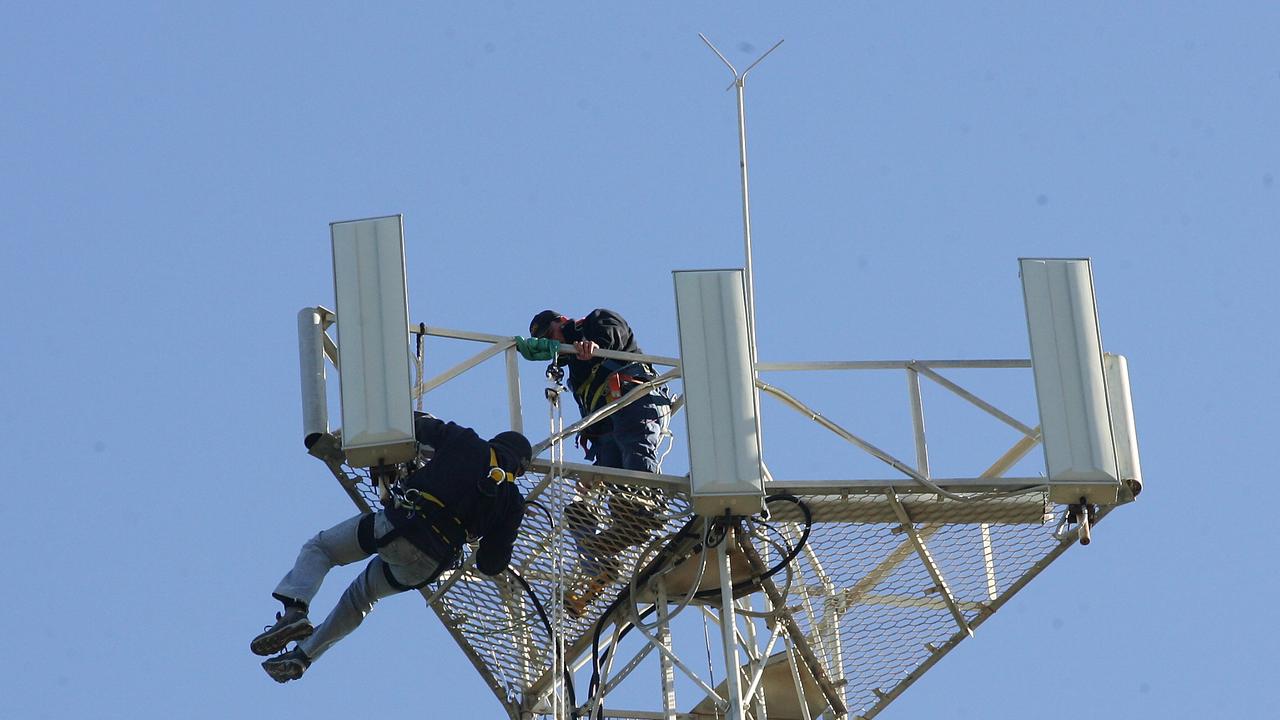Bush Legend: Fred Brophy, the last showman
Fred Brophy — one of Australia’s last travelling showmen — has plenty of punches left as he reflects on his legendary career.
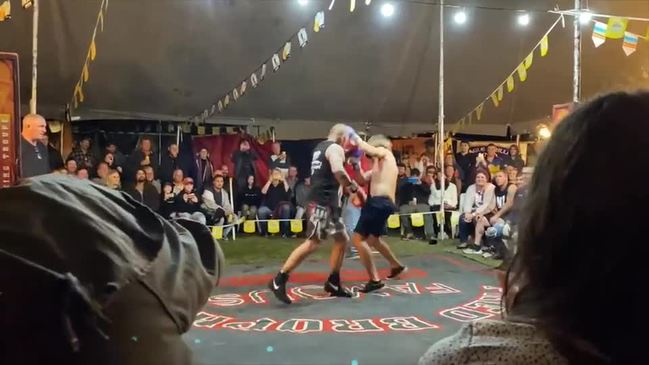
A lifetime spent traversing Australia with a travelling boxing troupe, visiting all corners of the continent, has made for a colourful life for Fred Brophy.
But ask the legendary showman to tell you something surprising about himself, and he comes up blank.
Ask his wife Sandi, however, and quick as a whip she’ll tell you about how Fred cut off two of his fingers, on purpose.
“I thought he was mad,” Sandi says.
“Fred does stupid things.”
Born at the Perth showgrounds during the Perth Show, show business is in his blood.
“I’m the fourth generation in show business,” Fred says.
“My mother and father would travel across the Nullarbor, and they were at the Perth Show when I was born. But I’m really a Queenslander.”
His legacy as a boxing legend – a stalwart of Australiana and operator of Australia’s last and only travelling boxing troupe – far outweighs the wilder things he’s done in his life.
He’s written a book – The Last Showman – in which he describes himself as the fairest referee in the outback.
He also describes himself as a young man as a boy who couldn’t resist a fight – “trouble seemed to be my middle name for a while” – a reputation which eventually earned him a stint in prison at the tender age of 17.
But his efforts in the latter part of his life awarded him a place in the Queensland Boxing Hall of Fame in 2009, and an Order of Australia Medal in 2010 for his services to the entertainment industry and charity.
Turning 70 this year, Fred has spent a lifetime working in show business, travelling to parts of Australia most people have never been to with his troupe of about 15 loyal and often-changing boxers.
“I’ve got three generations boxing with me at the moment. Some of them have been with me for 15 to 20 years,” Fred says.
Fighters are recruited by simply approaching Fred for an opportunity to fight: he then decides whether to try them out “and see if they’ll behave themselves”.
Among his current troupe of fighters are a few women, including one fighter known as The Beaver.
“She’s been with me for 15 years, she’s got hairs on her legs that would spear a rat.”
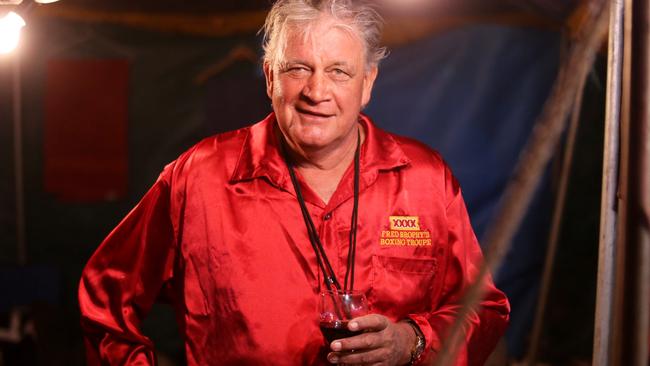
GOLD RUSH RUMBLE
The boxing tent was one of the first forms of entertainment to come to Australia, long before horseracing, according to Fred.
And as Fred tells it, boxing in Australia really took off as a form of entertainment about the time of the Gold Rush, with an influx of men mining at Bendigo and Ballarat.
“There were about 50 bars and 100 hotels (in Ballarat) and they needed a bit of entertainment,” Fred says.
“Because there was nothing else to do, they would spend their money, they would circle around outside, and bare-knuckle fight. Nearly every weekend there was a fight somewhere. It was some of the first entertainment in Australia, and I’ve been in it for four generations and still doing it. It’s Australia’s heritage.”
It’s this heritage and tradition of showmanship and old-fashioned boxing that drives Fred.
But his passion for preserving the ways of old is spurred on by a feeling that Australia is losing too much of its heritage.
“It’s changing a little in the country. All the Australian ways, and our traditions, are starting to go. But what we’ve got left, the rodeos, the campdrafts, are more popular than ever,” Fred says.
“People in the city are starting to see that more, too. When we travel to the cities, you’d be surprised how many people have never been to a rodeo. We’re bringing the country to the city.
“A lot of people don’t understand where their milk and bread comes from, that’s why we need these shows. Because they start to appreciate it more, anything that’s Australian, and I think that’s great.”
Covid-19 put the brakes on the travelling troupe in 2020, but the tent made a spectacular return at the 2021 Beef Australia event in Rockhampton; an iconic event in itself that draws thousands of people from all parts of Australia.
Tent boxing in Australia has changed since Fred first got involved: tent boxing was banned in the early 1970s in NSW, Victoria, Western Australia and South Australia.
And while Fred could operate his boxing tent in southern states if he were to make changes to comply with professional boxing regulations, he has no plans to do so.
“I would have to change my rules to suit them,” Fred says.
“So I don’t do it. They want me to change to a professional boxing ring, and I’m not going to do it.”
DRUM UP BUSINESS
When the Brophy boxing troupe rolls into town, from Mt Isa to Birdsville and beyond, Fred garners interest from the locals by banging on his drum and ringing a bell.
Fred calls out for local challengers to take on his travelling troupe of boxers, the hypnotic, rhythmical sounds of the drum and bell guaranteed to draw a crowd of locals, many of who travel from remote cattle stations and farms.
He says after all these years, he still receives plenty of interest from regional communities, with men looking to spend a night boxing.
“I get a lot of support. All the young blokes would come out from the stations, and farms, to box,” Fred says.
“Now they own their own stations and they still come in, and they’ll bring their young ringers in. I love to see them come in.”
It also has a surprising effect for local law enforcement.
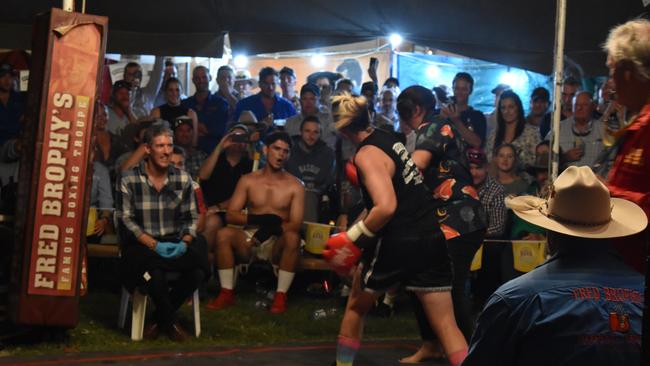
“The police love it. It quietens everyone around,” Fred says.
“All I’ve wanted to do, since I was five years old, was have a boxing tent.”
For Fred, being a showman is all he has known.
And while he and Sandi both run the Cracow Hotel in Cracow, Queensland, he remains focused on keeping the boxing troupe rolling as long as he can.
“It belongs to Australia, and we should keep it going,” Fred says.
He says families who hold on to longstanding Australian bush traditions, such as horse-mounted cattle mustering, are a credit to our history.
“It’s part of Australia, and we should be holding on to it for our grandchildren.
“While the name Brophy is going, I’ll keep this going.”
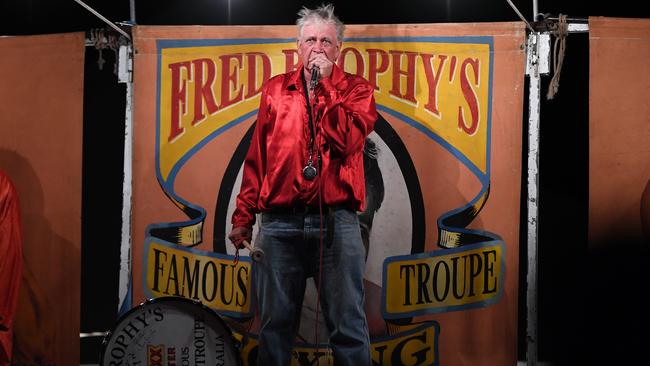
GIFT OF THE GAB
One of Australia’s last showmen, wife Sandi says Fred can talk for hours.
“ … no-one can get up and spruik the board like he can,” Sandi says.
“He is a good story teller. You can listen to his stories for ages. It was why we had the idea to write a book, and he wrote it all in longhand.
“He really loves to talk, and tell stories. It’s like a modern-day Hans Christen Anderson.”
And what about the fingers he chopped off?
Sandi doesn’t delve into too much detail.
But in his book, Fred illustrates all the gory details.
Aged just 18, and with a heavily pregnant wife on the outside, Fred was incarcerated at Fremantle Prison.
After Sandi wrote a letter saying she wanted to break off their marriage, Fred made the bold – albeit it a bit mad – decision to remove one of his fingers using a meat slicer during his prison work time, in the hopes he would be hospitalised and out of prison.
But the plan backfired.
“The whole episode had taken just two hours and been a complete waste of time, and a finger. The only bright spot was that when the news got back to Sandi, she felt sorry for me and agreed to come visit me,” Fred writes.
Years later, in the 1980s while travelling through southern Australia, a number of showmen joined Fred and Sandi to celebrate her birthday.
An argument between Fred and his wife spurred him to make a gesture of love for Sandi: he placed the little finger of his left hand on a block of wood, and lopped it off with an axe.
Sandi wasn’t impressed, she says down the phone.
“I thought he was mad.”





